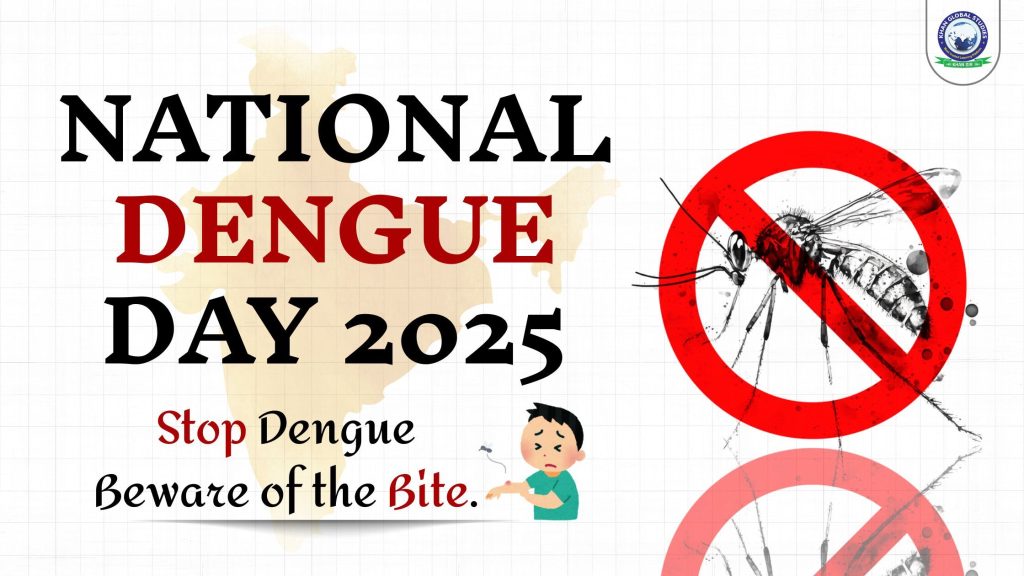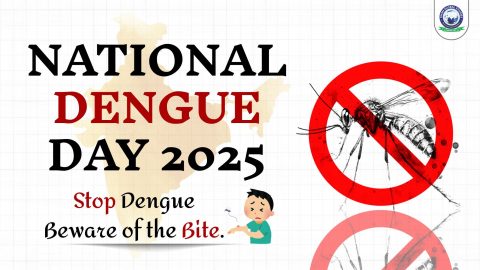Every year, National Dengue Day is observed in India on May 16. The day aims to spread awareness about dengue fever across the country, promote preventive measures, and emphasize the importance of timely treatment. With increasing urbanization and climate change in India, the number of dengue cases is rising annually. In this context, National Dengue Day has become a necessary initiative to combat the disease in time.
When is National Dengue Day Observed?
- Date: May 16, 2025
- Organizing Body: Government of India, Ministry of Health and Family Welfare
- Theme 2025: “Act Early, Stop Dengue: Clean Environment, Healthy Life”
What is Dengue?
Dengue is a viral infection spread by the bite of the Aedes aegypti mosquito. This mosquito usually bites during the day, especially in the morning and evening. There are four types of dengue viruses: DENV-1, DENV-2, DENV-3, and DENV-4. A person can be infected by any of these, and if reinfected with a different type, the risk of developing severe dengue (Dengue Hemorrhagic Fever or Dengue Shock Syndrome) increases.
Symptoms of Dengue
Symptoms generally appear 4 to 10 days after being bitten by an infected mosquito and can range from mild to severe:
- Common Symptoms:
- High fever (up to 104°F or 40°C)
- Headache
- Pain behind the eyes
- Severe muscle and joint pain (also called “breakbone fever”)
- Fatigue and weakness
- Skin rash
- Nausea and vomiting
- Mild bleeding from the nose or gums
- Severe Dengue (Dengue Hemorrhagic Fever):
- Rapid drop in platelet count
- Drop in blood pressure
- Excessive bleeding
- Confusion or restlessness
- Organ failure (in extremely severe cases)
Transmission Cycle of Dengue
- Dengue does not spread directly from person to person. The cycle is as follows:
- A mosquito bites an infected person and absorbs the virus.
- The virus incubates in the mosquito for 8–12 days.
- The mosquito then becomes a lifelong carrier of the virus.
- It bites another person, transmitting the virus into their bloodstream.
Dengue Situation in India
- Key Statistics:
- 2023: 289,235 cases and 485 deaths
- 2024: Over 233,000 cases and 236 deaths
- State-wise Data:
- Uttar Pradesh: 35,402 cases and 36 deaths in 2023
- Gujarat: 7,222 cases in 2024; 6,682 in 2023
- Reasons for Rising Cases:
- Climate change and irregular rainfall
- Urbanization and poor drainage
- Lack of public awareness
Preventive Measures Against Dengue
- There is no specific cure for dengue, but proper care can control it. Prevention includes:
- Keeping homes and surroundings clean
- Avoiding water stagnation
- Using mosquito nets and repellents
- Wearing full-sleeved clothing
- Covering containers like utensils and tires that collect water
Government Initiatives: Dengue Prevention Programs
- Under the National Vector Borne Disease Control Programme (NVBDCP), several measures are being taken:
- Surveillance Hospitals: 805 hospitals are equipped with advanced diagnostic facilities
- ELISA Test Kits: Provided free of cost to states for standard testing
- Active Surveillance: Regular monitoring to identify potential outbreaks
- Training Programs: For government officials, doctors, and healthcare staff
- Awareness Campaigns: Conducted in schools, colleges, and local councils (panchayats)
Theme and Objectives of National Dengue Day 2025
- Theme: “Act Early, Stop Dengue: Clean Environment, Healthy Life”
- Objectives:
- Encourage people to recognize early symptoms and seek immediate medical attention
- Prevent mosquito breeding by removing dirt and stagnant water
- Promote community participation
- Make cleanliness a part of daily life
Importance of National Dengue Day
- Pre-Monsoon Alert: Observed as a precautionary measure before the monsoon season
- Public Awareness: Educate people on symptoms, treatment, and prevention
- Community Participation: Encourage efforts like “Dry Day” to prevent water stagnation
- Strengthening Healthcare Services: Promote timely treatment and better health management
- Involving Educational Institutions: Make school children and youth aware of hygiene practices
Frequently Asked Questions
Q1: Does dengue occur only during the monsoon?
A: Dengue cases are more common during and after the monsoon due to ideal breeding conditions for mosquitoes, but it can occur in other seasons too if precautions are not followed.
Q2: Can dengue be treated at home?
A: Mild cases can be managed at home with a doctor’s advice. However, if symptoms like low platelet count, high fever, or bleeding occur, hospitalization is necessary.
Q3: Can a person get dengue more than once?
A: Yes. There are four types of dengue viruses. Immunity is developed only for the type one was infected with, leaving risk for the other three.
Q4: What is the most important step to prevent dengue?
A: Cleanliness and protection from mosquito bites. Preventing water stagnation around the house is the first and most crucial step.
Conclusion
National Dengue Day 2025 is not just a day of awareness—it is a call for collective action. With the message “Act Early, Stop Dengue”, the day reminds us that recognizing the disease early and adopting preventive measures can protect not just ourselves but our entire community from this life-threatening illness.
We must turn this one-day initiative into a year-round habit—prioritize cleanliness, share knowledge, and encourage those around us to stay informed. Only through collective effort can we realize the dream of a Dengue-Free India.





